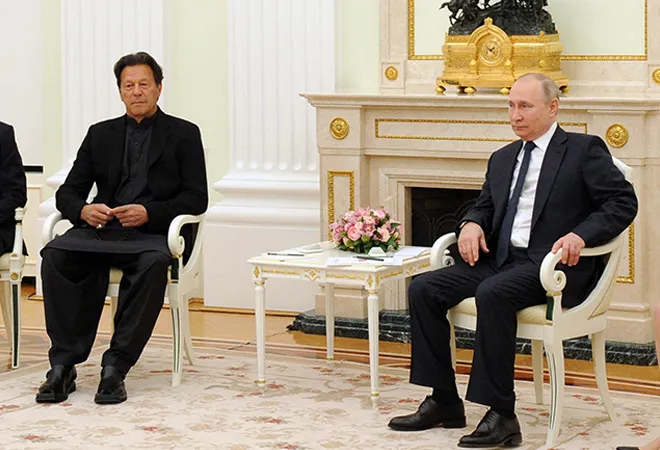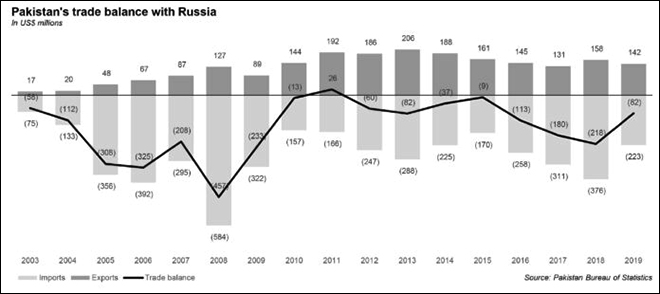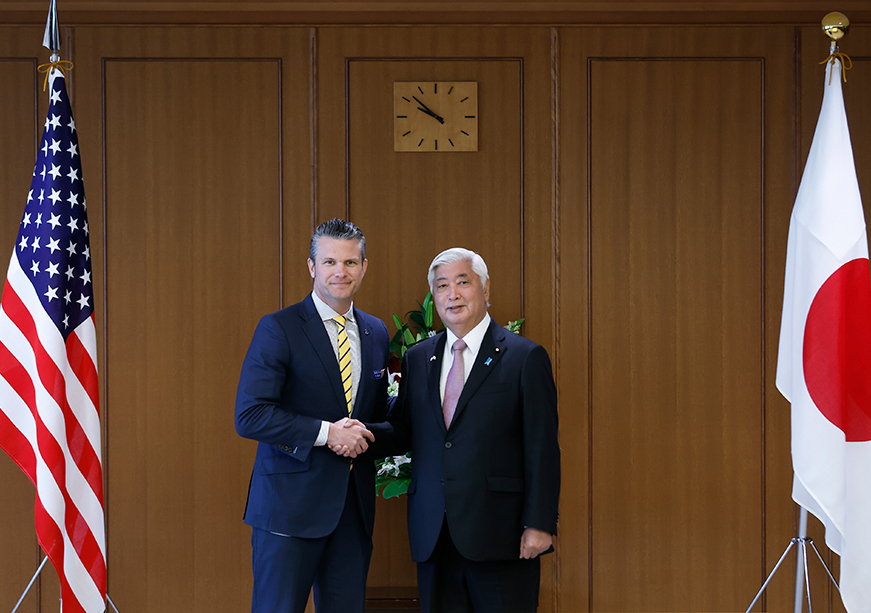
In a bid to bolster relations with Russia, Pakistan’s Prime Minister (PM) continued his two-day official visit to Moscow, amidst Russian military deployment in eastern Ukraine and escalating regional tensions. The talks focused on economic cooperation and the long-delayed North-South gas pipeline, which is to be built in collaboration with Russian companies.
PM Khan was the first Pakistani leader to visit Russia in over two decades and also the first Head of State to be in Moscow after President Putin recognised the separatist regions of Donetsk and Luhansk. His ‘ill-timed’ visit attracted criticism as he faced dire economic conditions back home along with political uncertainty due to a motion of no confidence. Core Pakistani economic interests are still heavily reliant on western institutions like the International Monetary Fund (IMF), thus the meeting may leave Islamabad in limbo as it seeks financial assistance from such establishments.
Tagged as ‘bad diplomacy’, many in Pakistan cautioned against the timing of the visit. Russia has been amassing troops over the past year along its border with Ukraine, and recently, there were plenty of reports suggesting the possibility of an attack. Yet, d’s desire to bridge ties with Moscow seemed to take priority in order to diversify Pakistani foreign policy in light of his growing anti-American posture. If reports from Pakistan are to be believed, the Russians did not invite him, rather the invitation was sought after.
Core Pakistani economic interests are still heavily reliant on western institutions like the International Monetary Fund (IMF), thus the meeting may leave Islamabad in limbo as it seeks financial assistance from such establishments.
Underlining that his visit is primarily focused on bilateral relations, PM Khan in an interview with Russian media expressed that Pakistan does not want to become a part of any bloc rather desires to trade with all the countries to lift the people out of poverty. On the optics of his ‘work-visit’ to expand Pakistan’s geopolitical horizons, he remarked that ‘‘this does not concern us, we have bilateral relations with Russia and we really want to strengthen it’’, he also emphasised a peaceful resolution to the regional conflict.
Pakistan’s relationship with Russia, although far from being categorisable as strong, has evolved from the Cold-War era, when the former allied with the United States (US). As a testament to an improving relationship, the two countries have also been conducting regular joint military exercises since 2016. Additionally, both countries share security concerns as they face threats from different terrorist organisations from Afghanistan. The former Cold-War rivals seem intent on working towards extending their partnership as Pakistan requires energy and increased economic engagement. The trade relations between Moscow and Islamabad see a growing trend over the last decade (Fig 1) and they hope for further collaborations in the fields of energy and transit of goods, consultations, and closer political and security interactions.
Fig 1 - Pakistan Bureau of Statistics

As far as the commitment on the US $2.5 billion gas pipeline goes, it may be a repeat of 2014, when the Russians were sanctioned for the annexation of Crimea which led to the project getting stalled. Moscow has been heavily penalised by the US and its allies for its military operations and Khan will most likely be back to square one. Thus, raising questions on PM Khan’s endeavour which signals as an endorsement of Putin’s steps.
Both countries share security concerns as they face threats from different terrorist organisations from Afghanistan.
India Factor
By virtue of being India’s foremost regional adversary, Pakistan’s foreign policy developments are inevitably viewed in the context of the consequences they might entail for India, and Imran Khan’s visit to Russia is no different. This visit by the Pakistani Prime Minister comes at a period of speculations of an Indo-Russian drift owing to changing global dynamics which have driven India to forge a close nexus with the US and Russia to form a relationship with India’s most threatening regional rival, China, on account of their common and expanding rivalry with the US.
India has been Russia’s most trusted partner in the subcontinent for the longest time but the aforementioned developments were topped off by the Pakistani Prime Ministerial visit to Russia as expanding closeness between the two. Assumptions of India’s uneasiness with this emerging dynamic are natural, though it would be naïve to assume that the status of Pakistan’s relationship with Russia will be shortly alleviated to that of India’s.
However, it has been made abundantly clear time and again that the Indo-Russian dynamic is concretely based on the ideals of pragmatism. Both India and Russia look at their relationship independent of their equations with other powers. So, it is unlikely that at this current moment based on the status of this Russia-Pakistan relationship, India would feel threatened or concerned.
Assumptions of India’s uneasiness with this emerging dynamic are natural, though it would be naïve to assume that the status of Pakistan’s relationship with Russia will be shortly alleviated to that of India’s.
Furthermore, India has done commendably at the highly complicated job of navigating the complexities of its relationship with Russia while building a robust one with the US in a period of unprecedented turbulence in US-Russia relations. In the face of Russia’s disapproval, India has been working closely with the USwithin and outside the QUAD to shape the future of the Indo-Pacific. At the same time, India has also been able to re-affirm the value of what Russia means to it by various diplomatic engagements and gestures like establishing a 2+2 Ministerial mechanism—which it only had with its QUAD partners before—signing deals for more arms supplies, despite the looming threat of US sanctions. New Delhi also took a diplomatic stance towards the crisis in Ukraine through abstention at the UNSC and calling for a peaceful settlement of the issue via diplomacy. To India’s credit, the US also said that their relationship with India stands on its own merit despite India’s controversial decision to abstain from a UNSC vote on the Ukraine-Russia conflict.
In asserting that India would not let anyone dictate its preferred foreign policy trajectory, it stood a hefty risk of upsetting both of its top strategic partners, but this has not been the case so far. Therefore, Pakistan’s accentuated efforts at befriending Russia, although not favourable for India’s long-term interests, is currently much less of a headache than trying to balance its equations with the US or Russia. In conclusion, it is too early to ring the alarm bells on the detrimental effect that Pakistan’s relationship with Russia will have on the Indo-Russian equation, given that this equation seems to already have weathered more twisted geopolitical conundrums so far and continues to do so.
The views expressed above belong to the author(s). ORF research and analyses now available on Telegram! Click here to access our curated content — blogs, longforms and interviews.





 PREV
PREV



